Average age for Hip Replacement is somewhat around 50 to 80 years though the majority of operations are performed on those people between 60s to 70s years. Hip Replacement Surgery also known as hip arthroplasty is one of the most common orthopaedic care surgeries done these days to replace the damaged or inflamed hip joint due to arthritis, osteonecrosis, fractures or injuries etc. with a prosthetic implant. The artificial component may be made of metal, ceramic or hard plastic. The surgery relieves the patient of pain in hip joints, improves mobility and restores function in day to day life.
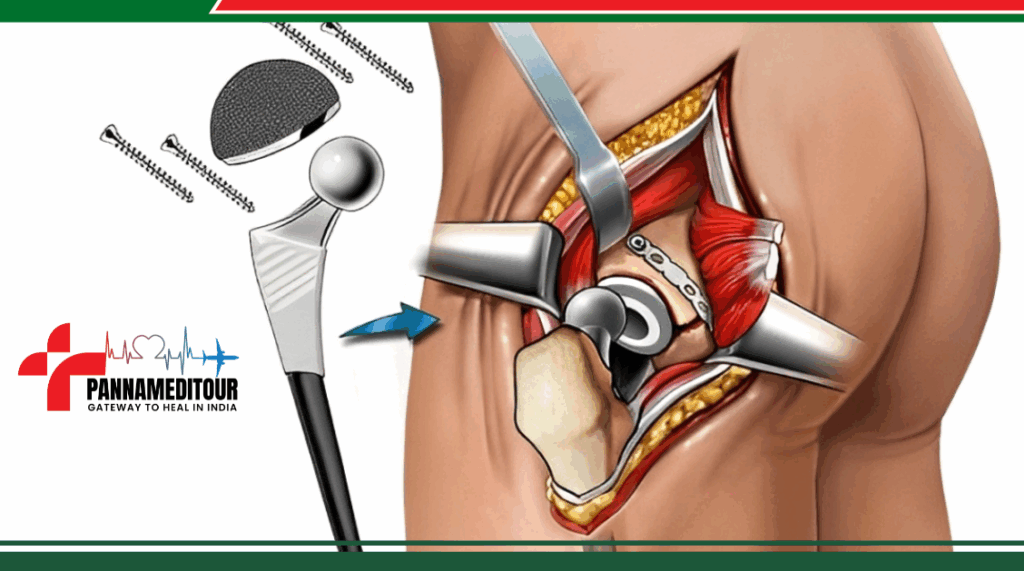
Now the most common question regarding hip replacement asked is : What is the average age for hip replacement ?
The average age for hip replacement is around 65 years old however even younger people in their 40s and 50s are also opting for this surgery due to early age arthritis and hip fractures etc.
Hip replacement surgery is required only when :
- Medication, physical therapy treatment and lifestyle changes does not provide any relief
- Walking and climbing stairs is difficult even with an aid
- Sleep is affected
Understanding the Hip Structure / Functioning
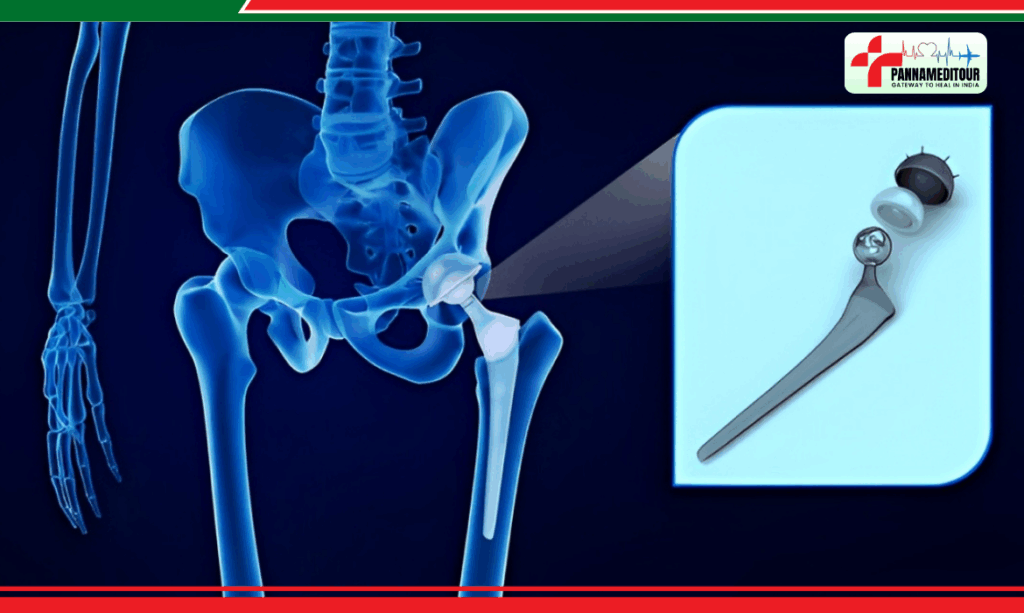
The hip joint is like a ball and socket joint formed by the integration of the femur bone head (the ball head) with the acetabulum (the socket) of pelvis providing stability and a range of movements to support the legs. When there is loss of mobility and pain in the hip joint due to wear & tear, injuries etc. hip replacement is recommended
Hip Implants have a life longevity of about 10 – 20 years though in some cases may even last longer.
Causes of Hip Replacement Surgery
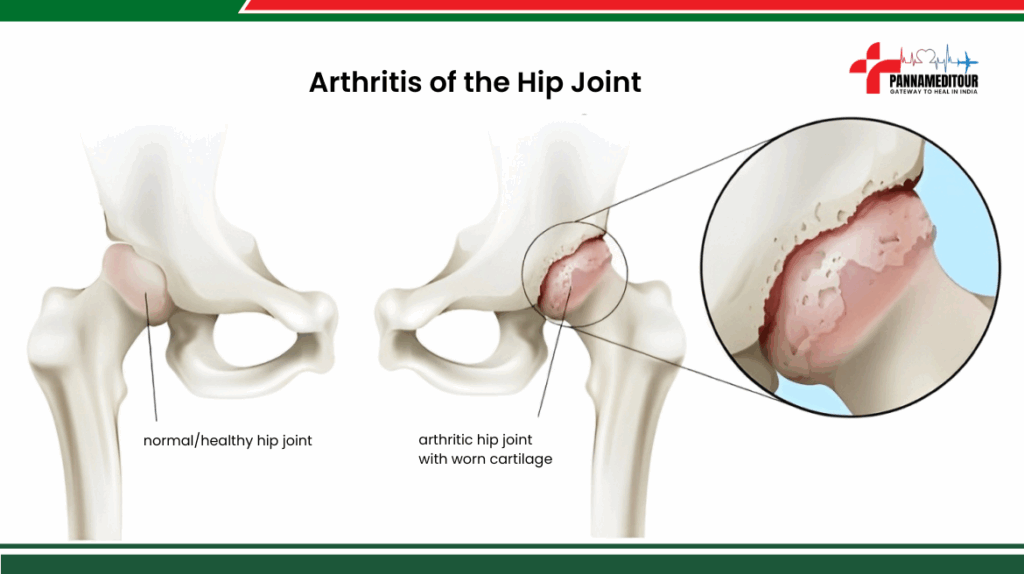
There are a varied no. of causes leading to degeneration / wear & tear of hip joints thus necessitating for hip replacement :
- Osteoarthritis : The most common cause, where the cartilage cushioning the hip joint wears down over time, leading to pain and stiffness.
- Rheumatoid arthritis : It is caused by an overactive immune system which results in inflammation of the bones eroding the cartilage thus facing bone deformation and pain.
- Osteonecrosis : In this condition, blood supply to the ball of hip joint is disrupted which may result in bone dislocation or fracture or bone may collapse
- Hip Fractures – Common in older adults, hip fractures due to falls or accidents often necessitate replacement.
- Developmental Hip Dysplasia – A congenital condition where the hip joint does not develop properly, increasing the risk of arthritis later in life.
- Young Age Hip Injuries – Trauma from sports injuries or accidents can cause long-term joint damage, leading to early hip replacement.
- Obesity and Sedentary Lifestyle – Excess weight puts additional strain on hip joints, accelerating wear and tear.
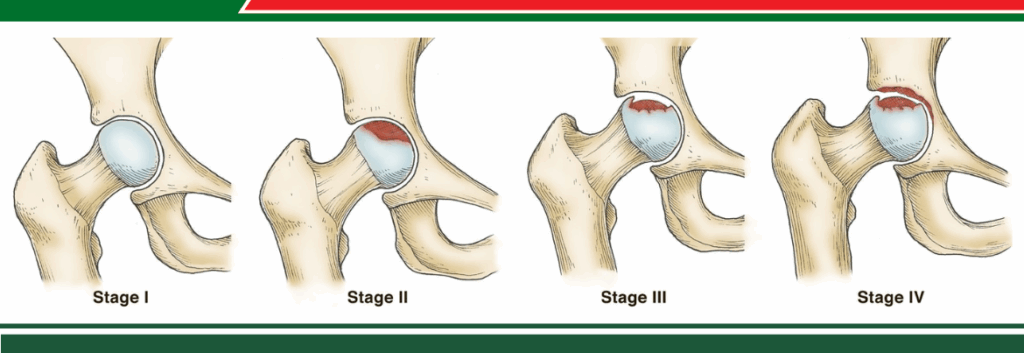
Factors Influencing Average Age for Hip Replacement Surgery
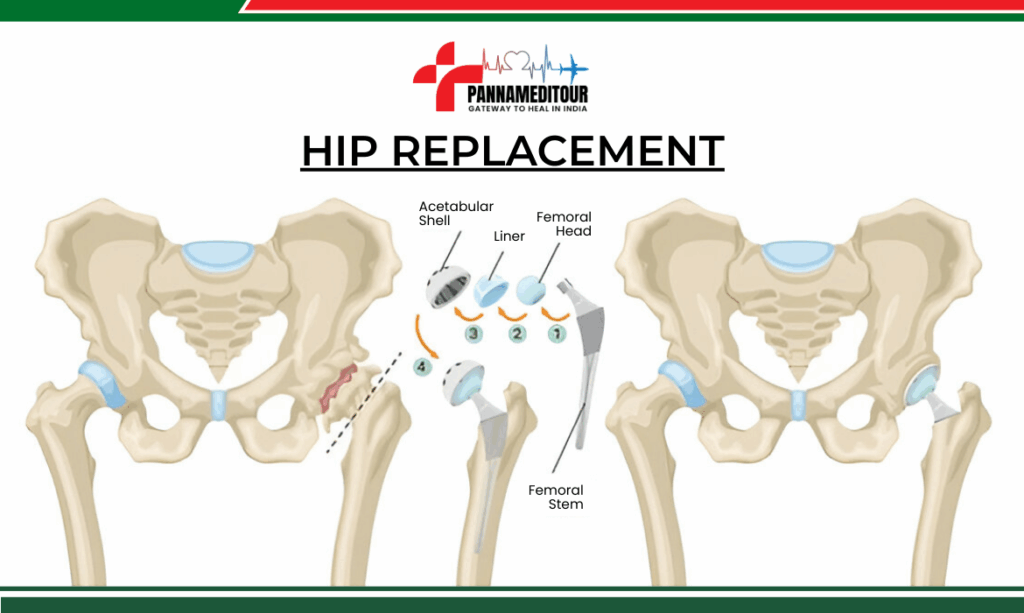
Some of the leading factors influencing the age for hip replacement procedure are :
- Severity of Joint Damage – Individuals experiencing severe pain and reduced mobility may require surgery earlier in life.
- Lifestyle and Activity Level – Athletes or highly active individuals may develop joint problems due to hip fractures or groin injuries, necessitating surgery at a younger age.
- Medical Advancements – Newer implant materials and minimally invasive techniques have made hip replacements more durable, encouraging younger patients to undergo the procedure.
- Rising Cases of Osteoarthritis in Younger Patients – Due to obesity, sedentary lifestyles, and previous joint injuries, many individuals are experiencing arthritis at a younger age.
Post Surgical Care & Rehabilitation
For faster recovery and pain free life, post surgical care and rehabilitation are essential for patients undergoing hip replacement surgery. This includes 👍
- Attend all your doctors and physiotherapists scheduled appointments
- Walking during the day under someone’s supervision is recommended
- Initially you may need a walker or crutches for walking and later on shift to cane
- Avoid bending the hip more than 90 degrees
- Don’t twist the upper body when standing
- Sleep on your back for first few days
- Do not sit or stand cross legged
- Eat healthy, nutritious food and maintain weight for faster healing and avoiding complications
- Do not drive until the surgeon permits you
- Engage in physical therapy sessions and exercises regularly to improve range of motion and strengthen hip muscles
Younger vs. Older Patients : Pros and Cons of Hip Replacement Surgery

While hip replacement offers life-changing benefits, the decision to undergo the procedure at a younger or older age has its pros and cons.
Younger Patients: They may experience a longer period of pain relief but are more likely to require a revision surgery later in life due to the wear and tear of the artificial joint.
Older Patients: They may not require a second surgery, as modern implants last between 15-25 years, but recovery may take longer due to age-related factors.
Risks & Complications
Various risks & complications associated with hip replacement surgery are :
During Surgery
- Chances of excessive bleeding thus requiring blood transfusion
- Risk of nearby blood vessels or nerves getting damaged during surgery
- During operation, healthy portions of the hip joint may get fractured
- Anaesthesia risks like in any other procedure
Post Surgery
- Sometimes Occurrence of infection around the incision area or new hip implant which is treated with antibiotics
- Blood Clot Formation may happen in leg veins which can travel to lungs, heart or brain posing serious threat to life
- The hip joint may dislocate after some time thus requiring brace for support or revised surgery
- Leg length discrepancy may arise as the leg whose hip is replaced may end up slightly longer or shorter than the other. But this slight difference is not noticeable to others
- During surgery, a nerve or tissue or ligament around the hip joint may damage. But this can be repaired during surgery or heal itself afterwards
- Sometimes, during or after surgery, fracture of the femur or pelvis may occur which can be fixed at that time
- Hip dislocation is possible soon after the surgery or years later resulting in pain or swelling. Some people may hear some clicking or popping sound coming from hip joints
- In some cases, there is abnormal formation of bone tissue around the hip joint causing pain and stiffness
- Using metal on metal implants in hip joints may wear down over time causing health issues. If you feel any new hip pain or clicking / popping sound coming from metal hip implant or less mobility than usual, immediately consult your doctor
Post Surgery Care Tips
For faster and smooth recovery post surgery, follow these guidelines and post recovery care tips :
- Follow your health consultant’s instructions
- Keep up all follow – up appointments and visit regularly your doctor for him to monitor your healing
- Prevent infection : Always wash your hands with soap before touching the incision place
- Keep eye on your Incision to observe the signs if any of being infected
- Stay hydrated means drink plenty of water
- Managing your pain is crucial
- Quit Smoking and avoid alcohol for speedy healing
- Keep moving like walking to prevent blood clots and improve circulation
Cost of Hip Replacement Surgery in India
The average cost of hip replacement in India may vary between 5500 USD to 10000 USD for unilateral and bilateral hip surgeries up to 12000 USD depending upon the type of surgery performed, various tests & diagnosis charges including X-rays, MRIs, CT Scans, arthrography, Ultrasonography etc., the hospital location, days of hospital stay, surgeon experience, post operative care and rehabilitation etc.
Conclusion
The average age for hip replacement surgery is between 60 to 80 years; however, younger people in their 40s, 50s and even those in 90s are undergoing surgery for hip joint fractures / bone deformities, hip joint damage due to accidents or sports injuries or developing osteoarthritis as a result of advancement in medical technology / surgical procedures.
MIT (Minimal Invasive Technique) for Surgery and Robotic assistance based orthopaedic surgeries and better quality implants ensure fast and smooth recovery in all age group patients thus helping them regain mobility, stability and function in their day to day life and lead pain free healthy lives hence hip replacement surgery can be a viable option for all above age group people.
India is emerging as one of the most sought after medical tourism destination for quality, affordable medical treatments to international patients including orthopaedic surgeries such as hip replacement surgery due to availability of best affordable hospitals, highly skilled surgeons, expert orthopaedic care, easy medical visa processing, cost effective stay & food facilities, etc.
Hope start here, Ready to feel better? Let’s Talk.




